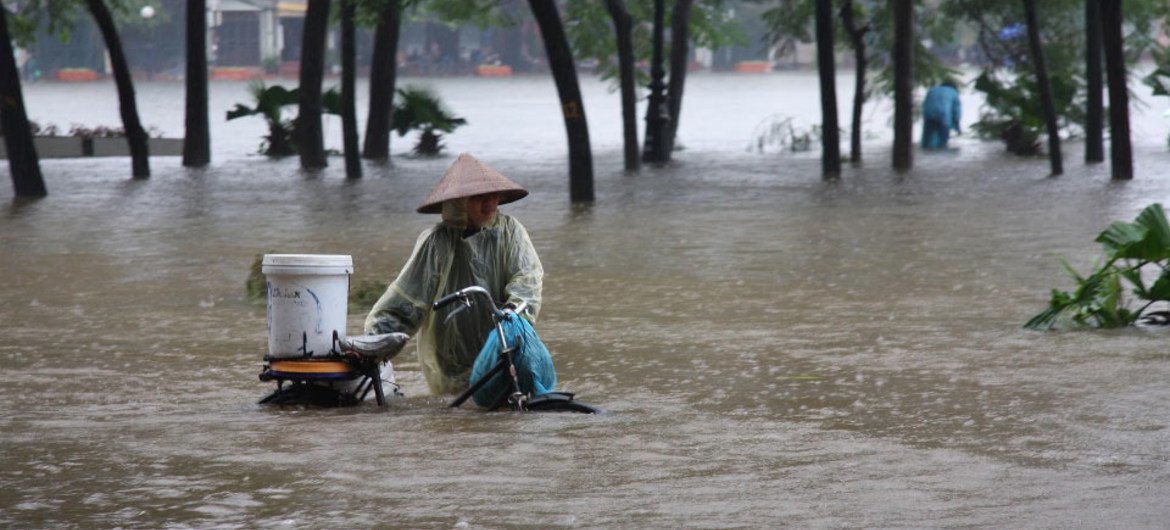
The past decade has been confirmed the warmest ever recorded, continuing an alarming 30-year trend that the UN weather chief said on Tuesday is “unequivocally driven by greenhouse gas emissions from human activities.”

Marked by record breaking land and ocean temperatures, the decade between 2011-2020 saw continued rising concentrations of greenhouse gasses that “turbo charged” dramatic glacier loss and sea-level rise, according to a new report from the UN World Meteorological Organization (WMO).
The report comes as the latest annual UN climate conference, COP28, reaches its midway point in Dubai, where countries have agreed on a new voluntary fund to pay vulnerable nations for losses and damages due to climate change.
But tough negotiations are ahead in the coming days regarding targets to curb greenhouse emissions and the phase out fossil fuels.
The WMO Decadal State of the Climate report, which was launched in Dubai, reveals that between 2011 and 2020, more countries reported record high temperatures than in any other decade.
It also sounds the alarm at the “particularly profound transformation” taking place in the polar regions and high mountains.
WMO goes on to warn that climate shocks are undermining sustainable development, with a dire impact on global food security, displacement, and migration.
“Each decade since the 1990s has been warmer than the one before it, and we see no immediate sign of this trend reversing,” WMO Secretary-General Petteri Taalas said, and underscored: “We are losing the race to save our melting glaciers and ice sheets.”
“We have to cut greenhouse gas emissions as a top and overriding priority for the planet in order to prevent climate change spiralling out of control,” he urged.
‘A glimmer of hope’
The report paints a grim picture, but it also highlights positive developments, including that successful international efforts to phase out ozone-depleting chemicals under the Montreal Protocol have resulted in a smaller Antarctic ozone hole during the 2011-2020 period.
In addition, advancements in forecasts, early warning systems, and coordinated disaster management have reduced casualties from extreme events, even though economic losses have increased, the WMO researchers observed.
Overall, however, the report underscores the need for more substantial measures. Indeed, while public and private climate finance nearly doubled from 2011 to 2020, a sevenfold increase is necessary by the decade’s end to meet climate objectives.
Key facts
The key findings made by the report’s authors cover multiple areas.
Proven by six different data sets used by WMO to be the warmest decade on record, the period of 2011-2020 has also beaten the record in greenhouse gas emissions.
For about 10,000 years before the start of the industrial era, atmospheric carbon dioxide remained almost constant, but since the mid-19th century when the industrial revolution broke up, CO2 has increased by nearly 50 per cent. That happened primarily due to the combustion of fossil fuels, deforestation, and changes in land-use.
To stabilize the climate and prevent further warming, emissions must be reduced massively, the report says, yet the greenhouse emissions keep amassing. Which the UN weather agency outlined in every detail in its Greenhouse Gas Bulletin published in November.
Ocean impact
The current climate warming has highlighted the particularly dire situation of the planet’s oceans: around 90 per cent of the accumulated heat in the Earth system is stored in the ocean. The report shows a strong increase of ocean warming rates over the past two decades.
At the same time, the accumulation of CO2 in the ocean drives up its acidification. A drop in the oceanic pH rate makes it more challenging for marine organisms to build and maintain their shells and skeletons – an imminent threat to marine biodiversity.
Melting ice
Another troubling factor of warming waters has been the melting of ice shields both on the North and South Poles that is driving up sea levels.
For example, during the past decade the Greenland and Antarctic continental ice sheets – the largest freshwater reservoirs on Earth – have lost 38 per cent more ice compared to 2001-2010.
As for Antarctica, the continental ice sheet lost ice at an average rate of 143 gigatonnes per year during the decade under study, with more than three-quarters of this mass loss coming from West Antarctica. Compared to the previous decade (2001-2010), this represents an increase of nearly 75 per cent in ice losses.
Ahead of COP28, UN Secretary-General António Guterres visited the area and noted with alarm the catastrophic impacts of climate change there.
“Fossil fuel pollution is heating our planet, unleashing climate anarchy in Antarctica,” said Mr. Guterres.
More damage, more often
There was a stark contrast between natural disasters causing large numbers of casualties and those incurring great economic losses, both in terms of the type of such events and their geographic distribution.
According to WMO, of the 13 known disasters during the period resulting in more than 1,000 deaths, six were heatwaves, four were monsoonal flooding or landslides associated with such flooding, and three were tropical cyclones.
Of the 27 events with known economic losses exceeding $10 billion dollars, in 2022, 16 occurred within the United States and eight in East Asia, 13 of the 27 events were tropical cyclones, eight floods and three wildfires.
(Source: UN News)


Hi there! This post couldn’t be written any better! Reading through this post reminds me of my previous room mate! He always kept talking about this. I will forward this article to him. Pretty sure he will have a good read. Thank you for sharing!